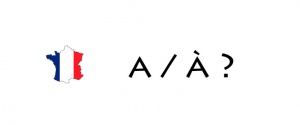Difference between revisions of "Language/French/Grammar/When-Use-à-or-a"
Jump to navigation
Jump to search
| Line 5: | Line 5: | ||
==a== | |||
'''a:''' form of the verb to have (avoir) at the 3rd person singular. | |||
So it is used with "Passé composé" for example. | So it is used with "Passé composé" for example. | ||
| Line 18: | Line 15: | ||
*Elle a mangé / She has eaten | *Elle a mangé / She has eaten | ||
TIP: You can substitute with have at the past : "avait" | |||
*Example: Il '''a''' trouvé une perle. ---> Il <span style="color:green;">avait</span> trouvé une perle. | |||
==à== | |||
'''à:''' preposition or part of a prepositional phrase (because of, from, etc.). It introduces an indirect object of the verb. | |||
TIP: You cannot replace with "avait". | |||
*Example: Loulou est partie '''à''' Québec. ---> Loulou est partie <del><span style="color:red;">avait</span></del> Québec | |||
"à" is not a verb. | "à" is not a verb. | ||
| Line 34: | Line 35: | ||
*Je veux à boire / I want a drink | *Je veux à boire / I want a drink | ||
==Pronunciation== | |||
"à" and "a" are pronounced the same. So if you talk to a french, don't worry about that ;) | |||
==Exercice== | |||
*Il est à/a toi. | *Il est à/a toi. | ||
| Line 49: | Line 50: | ||
*Il à/a presque tout à/a côté de lui. | *Il à/a presque tout à/a côté de lui. | ||
Revision as of 16:09, 27 February 2019
| When use: Quand or Quant? | Ou or Où? | a or à? |
How to know when we to write "à" or "a" in a sentence?
a
a: form of the verb to have (avoir) at the 3rd person singular.
So it is used with "Passé composé" for example.
- Elle a mangé / She has eaten
TIP: You can substitute with have at the past : "avait"
- Example: Il a trouvé une perle. ---> Il avait trouvé une perle.
à
à: preposition or part of a prepositional phrase (because of, from, etc.). It introduces an indirect object of the verb. TIP: You cannot replace with "avait".
- Example: Loulou est partie à Québec. ---> Loulou est partie
avaitQuébec
"à" is not a verb.
"à" is like "to" in sentences. (When used with the verbs, but not for places or gentive)
Note : "à" is in singular, in plural it is "aux"
- C'est à moi / It's mine
- Tu es à Orléans / You're in Orléans
- Je veux à boire / I want a drink
Pronunciation
"à" and "a" are pronounced the same. So if you talk to a french, don't worry about that ;)
Exercice
- Il est à/a toi.
- Il à/a déjà terminé?
- À/a tout à/a l'heure!
- Des choux à/a la crème.
- Il à/a presque tout à/a côté de lui.
